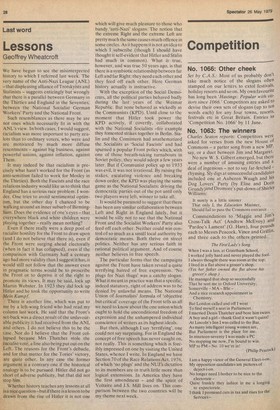Lessons
Geoffrey Wheatcroft
We have begun to see the misinterpreted history to which I referred last week. The very name of the Anti-Nazi League (ANL) -that displeasing alliance of Trotskyists and Stalinists suggests enticingly but wrongly that there is a parallel between Germany in the Thirties and England in the Seventies, between the National Socialist German Workers' Party and the National Front.
Such resemblances as there may be are not ones which necessarily fit in with the ANL's view. In both cases, I would suggest, racialism was more important to party zealots than to ordinary voters, who were and are motivated by much more diffuse resentments against big business, against powerful unions, against inflation, against Them.
It may indeed be that racialism is precisely what hasn't worked for the Front (as anti-semitism failed to work for Mosley in the Thirties). Both the Fascists and the race relations industry would like us to think that England has a serious race problem. I wonder. One tries to avoid sentimental optimism, but the other day I chanced to be walking around an inner suburb of Birmingham. Does the evidence of one's eyesthat everywhere black and white children were playing together-really mean nothing?
Even if there really were a deep pool of racialist hostility for the Front to draw upon (and I do not believe that there is), even if the Front were surging ahead electorally (when in fact it has collapsed), even if the comparison with Germany half a century ago had more validity than I suggest it has, it would still not follow that the answer even in pragmatic terms would be to proscribe the Front or to deprive it of the right to promote its views. It may be said, lock up Martin Webster. In 1923 they did lock up Hitler and he took the opportunity to write Mein Kampf.
There is another line, which was put to me by a left-wing friend who had read my column last week. He said that the Front's set-back was a direct result of the unfavourable publicity it had received from the ANL and others. I do not believe this to be the case. Nor do I believe that the Front collapsed because Mrs Thatcher stole the racialist vote, a line also being put out on the Left. The reasons for the Front's debacle, and for that matter for the Tories' victory, are quite other. In any case the former argument is a contrary one if the historical analogy is to be pursued. Hitler did not go short of adverse publicity, but that did not stop him.
Whether history teaches any lessons at all isa nice question-but if there is a lesson to be drawn from the rise of Hitler it is not one which will give much pleasure to those who bandy 'anti-Nazi' slogans. The notion that the extreme Right and the extreme Left are pretty much the same causes much offence in some circles. As it happens it is not an idea to which I subscribe (though I should have thought it self-evident that Hitler and Stalin had much in common). What is true, however, and was true 50 years ago, is that there is a symbiotic relationship between far Left and far Right: they need each other and they feed off each other. Here German history actually is instructive.
With the exception of the Social Democrats, all the political parties behaved badly during the last years of the Weimar Republic. But none behaved as wickedly as the Communists (KPD). Until close to the moment that Hitler took power the KPD actively, if covertly, collaborated with the National Socialists -for example they tomented strikes together in Berlin. Stalin and the Comintern had anathematized the Socialists as 'Social Fascists' and had spurned a popular Front policy which, with one of those breath-taking turnabouts in Soviet policy, they would adopt a few years later. But if Communist policy up to 1933 was evil, it was not irrational. By raising the stakes, escalating violence and breaking down order, the KPD was playing the same game as the National Socialists: driving the democratic parties out of the pot until only two players were left, winner to take all.
It would be paranoid to suggest that there has been any similar collaboration between Left and Right in England lately, but it would be silly not to see that the National Front and the Socialist Workers' Party also feed off each other. Neither could win control of so much as a small local authority by democratic means. Both thrive on street politics. Neither has any serious faith in rational political argument. And of course neither believes in free speech.
The particular forms that the campaigns against the Front have taken reveal a quite terrifying hatred of free expression. 'No plugs for Nazi thugs' was a catchy slogan. What it meant in practice was that a specific, indeed statutory, right of address was to be denied by unlawful means. The National Union of Journalists' formula of 'objective but critical' coverage of the Front tells us all we need to know about the one union which ought to hold the unconditional freedom of expression and the unhampered individual conscience of writers as its highest ideals.
But then, although I say 'terrifying', one could not say surprising. For in England the concept of free speech has never caught on, not really. This is something which is forcibly impressed on one by visiting the United States, whence I write. In England we have Section 70 of the Race Relations Act, 1976, of which 'no plugs' and the NUJ's dictation to its members are in truth little more than logical extensions. In America they have the first amendment and the spirit of Voltaire and J.S. Mill lives on. This comparison between the two countries will be my theme next week.


































 Previous page
Previous page